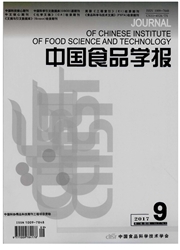

 中文摘要:
中文摘要:
探讨茶多酚饮食对HFA小鼠肠道菌群多样性和脂肪代谢的影响。将24只无菌C57BL/6J小鼠灌胃健康志愿者粪便悬液,构建HFA模型后随机分为3组(n=8),分别为常规组(Low Fat,LF),喂养常规饲料;高脂组喂养高脂饲料(High Fat,HF);茶多酚组在饮用水中添加质量分数0.2%的茶多酚(Tea polyphenol,TP),同时喂养高脂饲料(HF+0.2%TP)。干预8周后,测定小鼠体重、脂肪质量及血糖血脂水平,采用变性梯度凝胶电泳(DGGE)技术分析小鼠肠道菌群的多样性。高脂组小鼠的体重、脂肪质量、血清中TCH、TG、LDL-C水平相比于常规饲料组极显著升高(P〈0.01),肝质量显著增加(P〈0.05),茶多酚组小鼠体重、脂肪质量、TCH、TG水平极显著低于高脂组(P〈0.01),LDL-C含量显著低于高脂组(P〈0.05)。此外,高脂组小鼠肠道菌群的多样性显著低于常规饲料组和茶多酚组(P〈0.05)。茶多酚干预能有效缓解高脂饮食引起的肠道菌群多样性降低以及血清中甘油三脂、胆固醇和低密度脂蛋白的升高。
 英文摘要:
英文摘要:
The aim of the present study was to assess the effects of a tea polyphenols diet on the diversity of gut microbiota and lipid metabolism in Human flora associated (HFA) mice. HFA model mice were built with germ free C57BL/6J mice gavaged with human fecal suspension. Then HFA mice were divided into three group randomly (n=8): Low Fat(LF) fed with normal diet; High Fat(HF) with high fat diet; and HF+0.2% TP with high fat diet and drinking water with 0.2%(w/w) polyphenols. After 8 weeks, body weight, fat weight, blood glucose and lipid levels of mice were gathered and compared within different group; denaturing gradient gel electrophoresis(DGGE) technology was performed to evaluate the diversity of gut microbiota, body weight, fat weight, serum TCH, TG, LDL-C levels of HF mice were significantly higher (P〈0.01) than those of LF mice, and liver weight also higher (P〈0.05) than that of LF mice; however, when feed with high fat diet and 0.2% TP, body weight, fat weight, TCH, and TG levels were signifieantly decreased (P〈0.01) compared with those of HF mice, and LDL-C also lower (P〈0.05) than that of HF mice. Mo reover, Bacterial diversity in group HF was lower (P〈0.05) than that in group LF and TP. Our finds suggested that tea polyphenol can relief the negative health effect of high fat diet, including decreased diversity mierobiota in GI tract and increased of TG,TCH and LDL-C serum level, induced by a high fat diet.
 同期刊论文项目
同期刊论文项目
 同项目期刊论文
同项目期刊论文
 期刊信息
期刊信息
